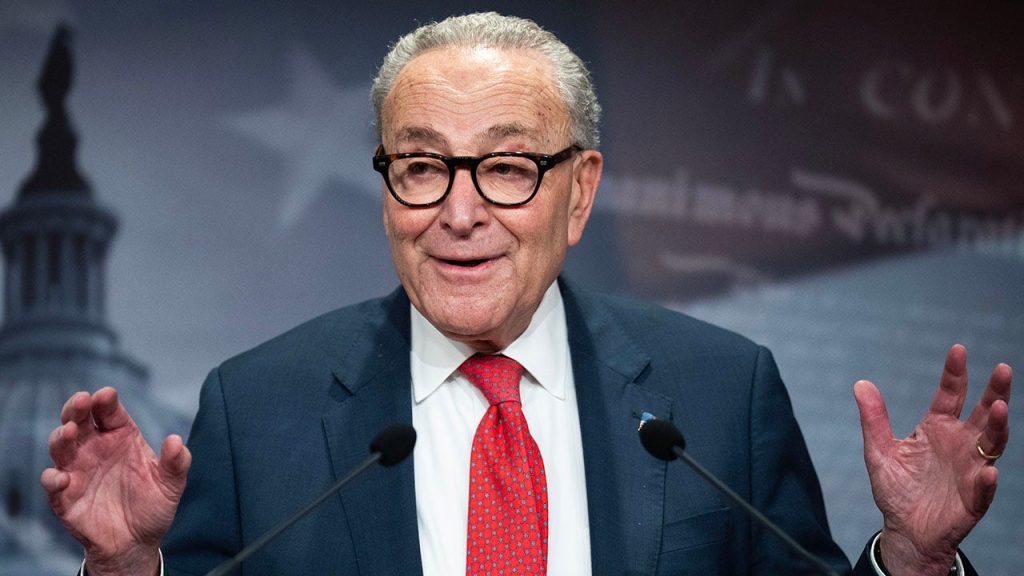Listen to the article
The Senate took a significant step toward ending the government shutdown on Sunday as eight Senate Democrats broke ranks with their party leadership and joined Republicans in advancing legislation to reopen the government. The shutdown, now in its 40th day, appears closer to resolution as bipartisan momentum builds in the upper chamber.
The defectors from Senate Minority Leader Chuck Schumer’s position included Senators Angus King (I-Maine), John Fetterman (D-Pa.), Catherine Cortez Masto (D-Nev.), Jeanne Shaheen (D-N.H.), Maggie Hassan (D-N.H.), Jacky Rosen (D-N.M.), Tim Kaine (D-Va.), and notably, the Senate’s second-ranking Democrat, Dick Durbin (D-Ill.).
“The question was, does the shutdown further the goal of achieving some needed support for the extension of the tax credits? Our judgment was that it will not,” explained Senator King, reflecting the pragmatic stance taken by the Democratic senators who crossed the aisle.
For weeks, Senate Democrats had maintained they would only vote to reopen the government if the legislation included extensions for expiring Obamacare subsidies. However, the compromise solution developed over recent days contains no such guarantee. While Democrats secured some concessions, including the reversal of furloughed worker firings undertaken by the Trump administration and guaranteed back pay for affected federal employees, they failed to achieve their primary healthcare objective.
The compromise continuing resolution (CR) only includes a promise from Senate Majority Leader John Thune (R-S.D.) to hold a vote on the Obamacare subsidies issue by the second week of December. This represents a significant concession by Senate Democrats with minimal healthcare policy guarantees to show for their weeks-long standoff.
Schumer criticized the compromise, saying, “This healthcare crisis is so severe, so urgent, so devastating for families back home that I cannot, in good faith, support this CR that fails to address the healthcare crisis.” He further charged that when Republicans rejected Democrats’ counter-proposal that would have extended the expiring subsidies for a year, “They showed that they are against any health care reform.”
The progressive wing of the Democratic caucus expressed particular dissatisfaction with the developments. Senator Bernie Sanders (I-Vermont) warned that “if Democrats cave on this issue, what it will say to Donald Trump is that he has a green light to go forward toward authoritarianism. And I think that would be a tragedy for this country.”
Despite this breakthrough, several procedural hurdles remain before the government fully reopens. Sunday’s vote was just the first in a series needed to modify the original House-passed continuing resolution and combine it with a three-bill spending package. If passed, the revised legislation would fund the government until January 30, 2026, giving lawmakers time to complete appropriations through regular spending bills rather than resorting to another stopgap measure or comprehensive omnibus package.
“If we blow this window, we’re going to get stuck with a yearlong CR,” cautioned Senator John Hoeven (R-N.D.), highlighting the stakes involved in the current negotiations.
Even after Senate passage, the modified legislation would need approval from the House of Representatives before reaching President Donald Trump’s desk for signature. Additionally, Democrats could still impose procedural delays unless unanimous consent is reached among all 100 senators to expedite the remaining votes.
The Obamacare subsidy issue continues to generate heated debate. Senate Republicans have criticized how the subsidies direct funds to insurance companies, while Democrats question the sincerity of Republican concerns about healthcare reform.
Senator Ron Wyden (D-Ore.) expressed skepticism about Republican intentions, stating, “The point, I think that’s really relevant here, is if they’re serious, and I really question whether that’s the case.”
The emerging compromise reflects the growing pressure on both parties to resolve the shutdown, which has affected hundreds of thousands of federal workers and disrupted government services nationwide. As bipartisan negotiations continue, the path to reopening the government appears clearer but still requires additional legislative steps and cooperation between both chambers of Congress.
Fact Checker
Verify the accuracy of this article using The Disinformation Commission analysis and real-time sources.




9 Comments
The tax credit issue seems to have been a major sticking point, so it’s interesting that the Democrats decided it was not worth prolonging the shutdown over. This suggests a pragmatic shift in their strategy.
Yes, the Democrats appear to have recognized that continuing the shutdown was not an effective way to achieve their policy goals. Compromise and negotiation are often necessary in a divided government.
While the details of the compromise deal remain to be seen, it’s encouraging that senators are finding a way forward. Ending the shutdown should be the top priority at this point, even if it means forgoing certain policy demands.
Well said. Keeping the government functioning has to take precedence over specific legislative objectives. I hope this momentum carries through to a final agreement that can pass both chambers.
It’s good to see senators from both parties working together to find a solution, even if it means not getting everything they wanted. Maintaining government operations should be the top priority right now.
The willingness of some Democrats to break ranks and support reopening the government, despite not getting the Obamacare subsidies they wanted, shows they are prioritizing pragmatism over party lines. This could be a model for future bipartisan cooperation.
Absolutely. Compromise and a focus on practical outcomes over political posturing is what’s needed to end this impasse. Hopefully this sets a precedent for more bipartisan problem-solving in Congress.
Interesting that bipartisan momentum is building in the Senate to end this prolonged shutdown. It will be important to see how any compromise legislation is received in the House.
Yes, it’s a positive sign that senators from both parties are working together on a solution. Finding common ground is crucial for getting the government back up and running.